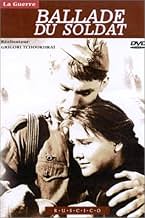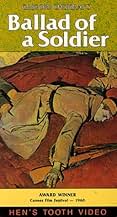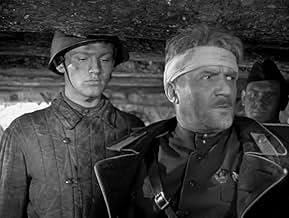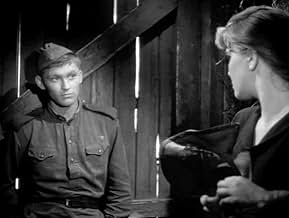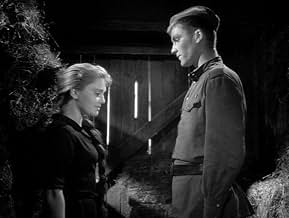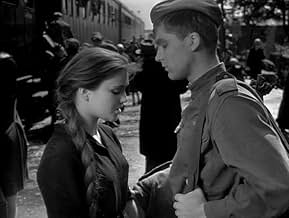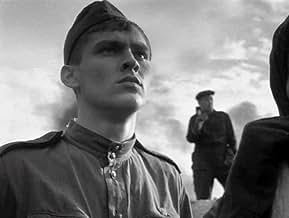IMDb रेटिंग
8.2/10
12 हज़ार
आपकी रेटिंग
अपनी भाषा में प्लॉट जोड़ेंYoung Russian soldier Alyosha earns a medal, but asks to visit his mother instead. His journey recounts various kinds of love during wartime.Young Russian soldier Alyosha earns a medal, but asks to visit his mother instead. His journey recounts various kinds of love during wartime.Young Russian soldier Alyosha earns a medal, but asks to visit his mother instead. His journey recounts various kinds of love during wartime.
- निर्देशक
- लेखक
- स्टार
- 1 ऑस्कर के लिए नामांकित
- 6 जीत और कुल 4 नामांकन
Vladimir Ivashov
- Alyosha Skvortsov
- (as Volodya Ivashov)
Mariya Kremneva
- Elizaveta Petrovna (Pavlov's Wife)
- (as M. Kremnnyova)
फ़ीचर्ड समीक्षाएं
10Rueiro
This is one of the greatest anti-war movies ever made and a touching little human drama that has not lost any of its power after half a century. After fifteen years since I first saw it, it remains among my ten favourite movies of all time from any country. It is full of poetry and visual beauty; a humble masterpiece from a young director at that time, who encountered all sorts of problems and restrictions during the shooting. Nevertheless, his perseverance to bring this work to life and the touchingly realistic performances of the cast make of this movie not only one of the best films that ever came out of the Soviet Union but also a classic gem of world cinema.
Ballad of a Soldier (1959)
An old fashioned but utterly gorgeous film about a soldier discovering something bigger about himself than even the war could teach him on the battlefield. It's a drama about life, photographed with what strikes me as a European poetic visual sensibility. In its lyrical flow, it is amazing. No other word for it.
In 1959, the Soviet Union was only 14 years away from the end of the war that cost them 23 million deaths (10 million of these were soldiers). And a ravaged countryside. This is monumental in a way that we Americans have trouble appreciating, even though our own losses were around 1 million, including civilians directly and indirectly. But with this kind of staggering history, the very touching tale of a very innocent boy wanting to get back to his mother for a single hug is heart wrenching. Director Grigori Chukhrai, himself Ukrainian, seems to know that his role, in the Khrushchev era of Cold War USSR, is to show the best of the Soviet heart and soul.
The journey, for the viewer, is often filled with silence, and with carefully composed shots of the boy, alone or with other travelers (often soldiers). The light and the framing is moving even on its own terms. Many times the key face in foreground is sharp and softly stark while many other faces fall out of focus around this, camera tilted, or looking up, with flickers of light from trees outside the train window or a diffused glow of a grey sky drenching it all with melancholy.
Alyosha, the young man who by some fast wits and luck knocked out two tanks in the first scene and earned this special trip, meets a variety of people on his way who each represent a part of the Soviet (mostly Russian, but with a nod to Ukrainians) experience: a wounded man going home without his leg, a young conscript heading to the front to probably never return, this same young man's father in a hospital apparently dying, and a girl his own age, equally pure and nearly untouched by life's horrors. In every case, there is a kind of Soviet optimism that is almost refreshing even if it is just slightly reminiscent of their earlier propaganda movies. Because, the wounded man meets his wife at the station and is renewed, the young conscript is cheerful and hale, the father is proud and glad his son is a good soldier, the mean officer has an understanding heart, the sergeant gives his only soap to the traveller, and so on.
But this kind of goodness is part of what makes the film special. There is no room for noir cynicism, or even existential loneliness. After all, Alyosha has found the truest of true love, and even though he may be returning to the war to never return, the boy and girl have elevated each other, and the movie, and the viewer, with a real sense of what being good is all about. If you can find this movie, see it by all means.
An old fashioned but utterly gorgeous film about a soldier discovering something bigger about himself than even the war could teach him on the battlefield. It's a drama about life, photographed with what strikes me as a European poetic visual sensibility. In its lyrical flow, it is amazing. No other word for it.
In 1959, the Soviet Union was only 14 years away from the end of the war that cost them 23 million deaths (10 million of these were soldiers). And a ravaged countryside. This is monumental in a way that we Americans have trouble appreciating, even though our own losses were around 1 million, including civilians directly and indirectly. But with this kind of staggering history, the very touching tale of a very innocent boy wanting to get back to his mother for a single hug is heart wrenching. Director Grigori Chukhrai, himself Ukrainian, seems to know that his role, in the Khrushchev era of Cold War USSR, is to show the best of the Soviet heart and soul.
The journey, for the viewer, is often filled with silence, and with carefully composed shots of the boy, alone or with other travelers (often soldiers). The light and the framing is moving even on its own terms. Many times the key face in foreground is sharp and softly stark while many other faces fall out of focus around this, camera tilted, or looking up, with flickers of light from trees outside the train window or a diffused glow of a grey sky drenching it all with melancholy.
Alyosha, the young man who by some fast wits and luck knocked out two tanks in the first scene and earned this special trip, meets a variety of people on his way who each represent a part of the Soviet (mostly Russian, but with a nod to Ukrainians) experience: a wounded man going home without his leg, a young conscript heading to the front to probably never return, this same young man's father in a hospital apparently dying, and a girl his own age, equally pure and nearly untouched by life's horrors. In every case, there is a kind of Soviet optimism that is almost refreshing even if it is just slightly reminiscent of their earlier propaganda movies. Because, the wounded man meets his wife at the station and is renewed, the young conscript is cheerful and hale, the father is proud and glad his son is a good soldier, the mean officer has an understanding heart, the sergeant gives his only soap to the traveller, and so on.
But this kind of goodness is part of what makes the film special. There is no room for noir cynicism, or even existential loneliness. After all, Alyosha has found the truest of true love, and even though he may be returning to the war to never return, the boy and girl have elevated each other, and the movie, and the viewer, with a real sense of what being good is all about. If you can find this movie, see it by all means.
Many Americans suffered enormously on account of WWII. My own grandmother, who not only survived the Great Depression but also World War I while it was being fought right in her own Polish town, once said that the most difficult event in her life was sending two of her sons off to battle in the faraway Pacific theater. One of them ended up in heavy combat on Okinawa, and the other one served as a bombardier.
As hard as World War II was for so many Americans, including my grandmother and my uncles, I believe that it was even more difficult for the Russians as a people. The terror of war came to their very doorsteps, civilians and warriors alike, and it was inescapable for them. Regardless of any specific political situation or attempt at propaganda by either side, I think that this historical fact must be objectively recognized and respected.
A "ballad" is a form of poetry, and, for me, "Ballad of a Soldier" is where poetry meets the camera. At the very beginning, the mother of the young, hero soldier who is the central character of the film looks out at the one unpaved road that leads in and out of her village. Somewhere at the end of the road, where ever that may be, is her beloved son. Overhead is an unforgiving sky, representing a sense of the power that controls all.
On the battlefield, we are terrified by a tank that is determined to chase our hero soldier through the countryside until he somehow manages to secure a position in order to destroy it and one other. Recognized by his superiors for his heroism, instead of a medal he requests a furlough pass to say farewell properly to his mother and to fix her leaking roof. It is granted for only a few days. Under the time pressure, the viewer witnesses his long, harrowing journey home from the front, experiencing the chaos, displacement, and hardship of the war on civilians and soldiers alike. In the mayhem and the confusion, he also manages to find true love at a most unexpected time and place.
I am sorry that this film was unavailable to me as a ten year old child in 1959 when it was produced. Aside from the political climate that prevailed at the time, which was mostly filled with fear, perhaps I would have been old enough to judge that Russian people were of the same flesh and blood that I was and that their lives, not only as Russians but as human beings, were affected very seriously by the horrors of war. While it would have been a very important lesson for me at the time, it did not come too late for me 57 long years later. This is a beautiful movie. See it!
As hard as World War II was for so many Americans, including my grandmother and my uncles, I believe that it was even more difficult for the Russians as a people. The terror of war came to their very doorsteps, civilians and warriors alike, and it was inescapable for them. Regardless of any specific political situation or attempt at propaganda by either side, I think that this historical fact must be objectively recognized and respected.
A "ballad" is a form of poetry, and, for me, "Ballad of a Soldier" is where poetry meets the camera. At the very beginning, the mother of the young, hero soldier who is the central character of the film looks out at the one unpaved road that leads in and out of her village. Somewhere at the end of the road, where ever that may be, is her beloved son. Overhead is an unforgiving sky, representing a sense of the power that controls all.
On the battlefield, we are terrified by a tank that is determined to chase our hero soldier through the countryside until he somehow manages to secure a position in order to destroy it and one other. Recognized by his superiors for his heroism, instead of a medal he requests a furlough pass to say farewell properly to his mother and to fix her leaking roof. It is granted for only a few days. Under the time pressure, the viewer witnesses his long, harrowing journey home from the front, experiencing the chaos, displacement, and hardship of the war on civilians and soldiers alike. In the mayhem and the confusion, he also manages to find true love at a most unexpected time and place.
I am sorry that this film was unavailable to me as a ten year old child in 1959 when it was produced. Aside from the political climate that prevailed at the time, which was mostly filled with fear, perhaps I would have been old enough to judge that Russian people were of the same flesh and blood that I was and that their lives, not only as Russians but as human beings, were affected very seriously by the horrors of war. While it would have been a very important lesson for me at the time, it did not come too late for me 57 long years later. This is a beautiful movie. See it!
Comedians used to poke fun at Soviet movies during the Cold War era. The claim was that every Soviet film could be characterized by a single standard plot line—"Boy meets tractor, Boy falls in love with tractor, Boy marries tractor". Now, I'm not sure how accurate the wags were since Soviet films were never shown here, nor ours there. But, given Soviet emphasis on collective farming, and their theory that art should follow politics, that sort of result wouldn't be surprising.
Nonetheless, Soviet-made or not, this 1959 humanist gem shines like a proverbial pearl in the night. Sure, the boy and girl are idealized, but were there ever two more charming performers; they even look alike. Moreover, it's that natural glow amidst the seediest surroundings that suggests what some might call a triumph of the human spirit. After years of slickly contrived Hollywood pairings, I was captivated by a warmth and chemistry seemingly so unforced and unrehearsed that I marvel at how it was done. In my book, it's one of the great compelling love stories of the big screen.
Just as importantly, the movie is anti-war, but subtly so. We do see some devastation and combat, but the real indictment lies elsewhere. It rests with all the potentials cut short by unrelenting demands of the war machine. The boy must return to his unit or risk being shot as a deserter. Thus he must abandon the injured soldier with whom he could have been friends; he must risk losing the love of his life because trains must run on wartime; he must leave his mother, without even time to fix the leaky roof. But most of all, war demands that he, like so many fine young men, must leave life with a personal potential that will go tragically unrealized. As one of Chukrai's effects brilliantly illustrates, war is indeed a world turned upside down.
Also, there are the stunning visuals. Those vast Russian steppes may be flat and boring. Nonetheless, the corresponding big sky makes a magnificent backdrop for heroic low-angle shots of those dwelling amidst the vastness. Then there's that long dusty road at film's end, leading off into a great unknown that Alyosha must now travel. In contrast are the teeming crowds at the railway station, looking nothing like Hollywood in their simple cloth dresses and shirts. And what concern with fancy hair-do's can the women have when their hair is bound down with knotted kerchiefs. All in all, it's a revealing look at what could be called the Russian peasantry of the time.
No, the movie clearly doesn't come from the ministry of propaganda. Still, there are concessions. Note how cooperative strangers become no matter how initially cranky they are. The army officers especially are portrayed as understanding and non-threatening. Nobody is depicted negatively, except maybe the disloyal wife. Not even the Nazi enemy responsible for 20 million Russian dead is mentioned, let alone, vilified. No, the real antagonist here is war itself; the point is not stated, but it is shown to an uncommonly moving degree. The dedication at film's end may be to the Russian soldier, but the subtext throughout aims at the universal, regardless of time, place, or nationality.
Thus 50 years later, the movie remains a timeless humanist classic. And with it, I think Chukrai deserves a place alongside the early masters of Soviet film, that is, before the Stalinist tyranny descended. Now, I have nothing against tractors. In fact, I wish Hollywood would feature more such life-affirming inventions than the exploding cars they so love and worship. Nonetheless, I guess I'm glad that here, there's not a single tractor in sight.
Nonetheless, Soviet-made or not, this 1959 humanist gem shines like a proverbial pearl in the night. Sure, the boy and girl are idealized, but were there ever two more charming performers; they even look alike. Moreover, it's that natural glow amidst the seediest surroundings that suggests what some might call a triumph of the human spirit. After years of slickly contrived Hollywood pairings, I was captivated by a warmth and chemistry seemingly so unforced and unrehearsed that I marvel at how it was done. In my book, it's one of the great compelling love stories of the big screen.
Just as importantly, the movie is anti-war, but subtly so. We do see some devastation and combat, but the real indictment lies elsewhere. It rests with all the potentials cut short by unrelenting demands of the war machine. The boy must return to his unit or risk being shot as a deserter. Thus he must abandon the injured soldier with whom he could have been friends; he must risk losing the love of his life because trains must run on wartime; he must leave his mother, without even time to fix the leaky roof. But most of all, war demands that he, like so many fine young men, must leave life with a personal potential that will go tragically unrealized. As one of Chukrai's effects brilliantly illustrates, war is indeed a world turned upside down.
Also, there are the stunning visuals. Those vast Russian steppes may be flat and boring. Nonetheless, the corresponding big sky makes a magnificent backdrop for heroic low-angle shots of those dwelling amidst the vastness. Then there's that long dusty road at film's end, leading off into a great unknown that Alyosha must now travel. In contrast are the teeming crowds at the railway station, looking nothing like Hollywood in their simple cloth dresses and shirts. And what concern with fancy hair-do's can the women have when their hair is bound down with knotted kerchiefs. All in all, it's a revealing look at what could be called the Russian peasantry of the time.
No, the movie clearly doesn't come from the ministry of propaganda. Still, there are concessions. Note how cooperative strangers become no matter how initially cranky they are. The army officers especially are portrayed as understanding and non-threatening. Nobody is depicted negatively, except maybe the disloyal wife. Not even the Nazi enemy responsible for 20 million Russian dead is mentioned, let alone, vilified. No, the real antagonist here is war itself; the point is not stated, but it is shown to an uncommonly moving degree. The dedication at film's end may be to the Russian soldier, but the subtext throughout aims at the universal, regardless of time, place, or nationality.
Thus 50 years later, the movie remains a timeless humanist classic. And with it, I think Chukrai deserves a place alongside the early masters of Soviet film, that is, before the Stalinist tyranny descended. Now, I have nothing against tractors. In fact, I wish Hollywood would feature more such life-affirming inventions than the exploding cars they so love and worship. Nonetheless, I guess I'm glad that here, there's not a single tractor in sight.
"Ballada o soldate" has one of the most poignant sequences of all war movies:when the mother holds only for a few minutes, her dear boy in her arms,it's impossible to hold back your tears .I saw the movie for the first time thirty years ago and I have never forgotten it.Far from politics ,"ballada o soldate" is an universal poem,enhanced by a magnificent grandiose score,which enhances the simple beauty of the pictures,climaxing on a symphony for the finale.
Aliocha's furlough is so short (48 hours) and it's such a long way to his dear home.His journey becomes an odyssey ,but ,unlike Ulysses,his happiness will be short-lived.He and the girl form one of the most touching,lovable and innocent couple you will see on a screen.Their simple joys ,particularly when they share the soldier's food,or when they meet again in the desert station,are the ones which make a life worthwhile,even in the hell which surrounds them.
Sometimes recalling Sirk's " a time to love and a time to die"(1958)from Erich Maria Remarque ,the great German pacifist writer,with which it shares the same disgust of war ("I wanted to film a subject which could condemn war",the director said),"ballada o soldato" is one of these rare movies that will reward you each time you watch it.
Aliocha's furlough is so short (48 hours) and it's such a long way to his dear home.His journey becomes an odyssey ,but ,unlike Ulysses,his happiness will be short-lived.He and the girl form one of the most touching,lovable and innocent couple you will see on a screen.Their simple joys ,particularly when they share the soldier's food,or when they meet again in the desert station,are the ones which make a life worthwhile,even in the hell which surrounds them.
Sometimes recalling Sirk's " a time to love and a time to die"(1958)from Erich Maria Remarque ,the great German pacifist writer,with which it shares the same disgust of war ("I wanted to film a subject which could condemn war",the director said),"ballada o soldato" is one of these rare movies that will reward you each time you watch it.
क्या आपको पता है
- ट्रिवियाThe can of meat the train guard is eating from was clearly marked: "U.S. Meat". This would have been correct in actual life due the United States' Lend Lease with the Soviet Union.
- गूफ़The movie is set in July 1942 (a news report over loudspeakers mentions a Soviet retreat from Rostov and Voronezh). Yet the film depicts German Tiger and Soviet T 34/85 tanks, which came into service, respectively, in mid 1943 and early 1944.
- भाव
Alyosha Skvortsov: Comrade General, instead of my decoration, could I go home to see my mother?
- कनेक्शनFeatured in Fejezetek a film történetéböl: A szovjet film 1953-1970 (1990)
टॉप पसंद
रेटिंग देने के लिए साइन-इन करें और वैयक्तिकृत सुझावों के लिए वॉचलिस्ट करें
- How long is Ballad of a Soldier?Alexa द्वारा संचालित
विवरण
- रिलीज़ की तारीख़
- कंट्री ऑफ़ ओरिजिन
- भाषाएं
- इस रूप में भी जाना जाता है
- Ballad of a Soldier
- फ़िल्माने की जगहें
- Mosfilm Studios, मास्को, रूस(Studio)
- उत्पादन कंपनी
- IMDbPro पर और कंपनी क्रेडिट देखें
- चलने की अवधि1 घंटा 28 मिनट
- रंग
- ध्वनि मिश्रण
- पक्ष अनुपात
- 1.37 : 1
इस पेज में योगदान दें
किसी बदलाव का सुझाव दें या अनुपलब्ध कॉन्टेंट जोड़ें


